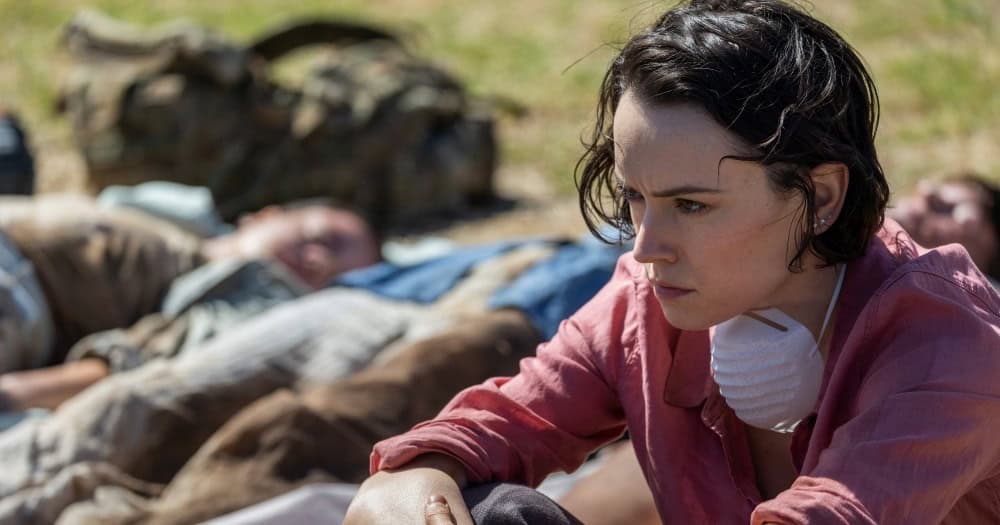Daisy Ridley takes center stage in this thought-provoking drama set against the backdrop of a man-made “zombie” pandemic, offering viewers a unique perspective on survival and loss.

INTRIGUING PLOT OVERVIEW: Following a catastrophic military experiment, a devastating chemical weapon incident has resulted in the loss of countless lives across Australia. Despite the overwhelming death toll, a select few among the deceased have returned in a state described as being “online,” where their existence straddles the line between life and death. The story follows an American woman, portrayed by Daisy Ridley, who, in her quest to find her missing husband, chooses to join a body retrieval unit. However, as she embarks on this harrowing journey, she soon finds herself venturing into uncharted territory, both physically and emotionally.
CRITICAL REVIEW OF THE FILM: Crafting an innovative zombie film is a challenging endeavor in today’s cinematic landscape, teeming with iterations of the genre. Since the release of 28 Days Later in 2003, audiences have been inundated with numerous films and a multitude of series like The Walking Dead and its various spin-offs. Amidst this saturation, the Australian film We Bury the Dead emerges as an attempt to elevate the genre through a more realistic and nuanced lens. In this narrative, the undead are not referred to as “zombies” and display characteristics that diverge from typical cinematic portrayals. Instead of being aggressive and driven by a craving for human flesh, these reanimated beings exist in a state of relative passivity, often retaining faint echoes of their former selves.
At the heart of the film is Daisy Ridley, who embodies Ava, a woman grappling with profound loss. Her husband, Mitch (played by Matt Whelan), was attending a corporate retreat in Tasmania when the disastrous chemical weapon incident unfolded, claiming millions of lives. In a bid to find closure, Ava joins a body retrieval team. Her determination compels her to persuade fellow volunteer Clay (Brenton Thwaites) to accompany her to a quarantined zone, where she hopes to locate her husband’s remains and confront the unresolved emotions surrounding his death.
Much of the narrative unfolds as a road odyssey through the desolate, infected landscapes of Australia. Rather than relying on traditional horror elements, the film emphasizes the human experience and emotional turmoil. Ava’s character is burdened with guilt, reflecting on how the days leading up to her husband’s ill-fated trip revealed cracks in their relationship. She harbors the hope that locating him, even in his “online” state, will allow her to offer him a more dignified farewell than the brutal military response that has characterized the fate of others who have returned.

Daisy Ridley delivers a compelling performance, powerfully conveying Ava’s intense grief over her husband’s demise and her desperate need for closure regarding his fate. Meanwhile, Brenton Thwaites breathes life into the character of Clay, a carefree Australian who copes with the trauma of their grim reality through reckless behavior, including partying and drug use. His character serves as a contrast to Ava’s somber journey, highlighting different coping mechanisms in the wake of tragedy.
As a character-driven drama, We Bury the Dead excels, showcasing the breathtaking beauty of the Australian countryside through stunning cinematography. The film is complemented by an evocative soundtrack composed by electronic artist Clay, enhancing the emotional weight of the narrative. However, the film occasionally stumbles, as writer-director Zak Hilditch falls into familiar genre clichés. A notable example is the inclusion of a tense character, played by Mark Coles Smith, whose portrayal as a tightly-wound soldier reveals him to be a predictable psychopath. This trope detracts from the film’s originality, making certain plot points feel overly familiar and diminishing the overall impact.
Despite its aspirations, We Bury the Dead sometimes feels like a rehash of existing zombie narratives, struggling to present fresh ideas in a saturated genre. Yet, the film maintains a level of entertainment throughout its runtime, largely due to its exceptional technical execution and the strong performances delivered by both Ridley and Thwaites. While it may not redefine the zombie genre, it presents a solid and engaging experience that resonates with viewers.







